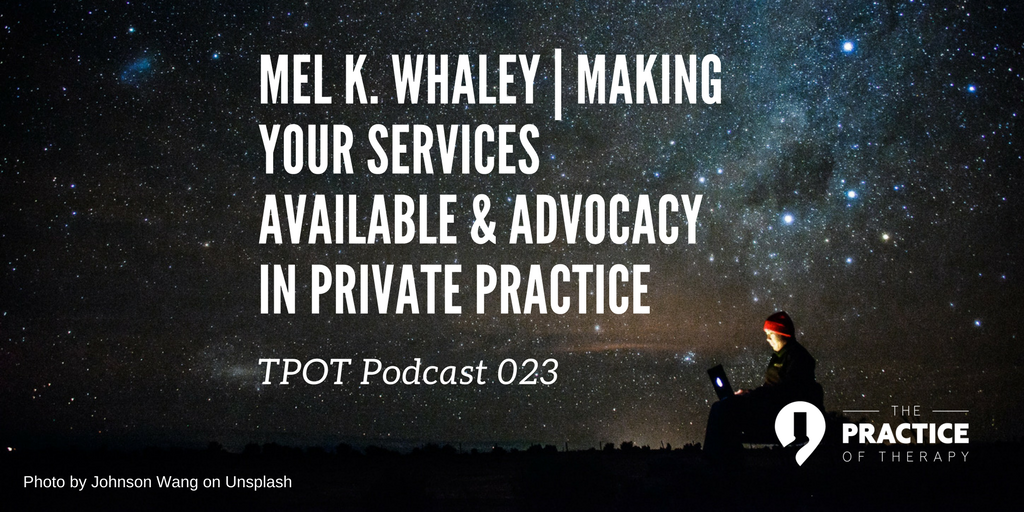In this episode of the Practice of Therapy Podcast, Gordon talks with Mel K. Whaley about advocacy and how to help make mental health services more readily available to the people that need it most. Most of us in the mental health field has gone into our professions out of a sense of “calling” or greater purpose. We genuinely want to help people.
Mel talks about several of the projects she has been working on in both the for-profit and non-profit sectors to help providers have better support and improve their performance in the way they run their practices. Mel’s main focus has been to use her business background to help clinicians work more efficiently and improve business processes.
Meet Mel K. Whaley
 Mel K. Whaley, OBM, MBA is the president of Tennessee Advocacy Talk: A nonprofit formed last year with the belief education is the key to success. They offer skill set training for people in need and mentoring to workers in the mental health fields to help raise their efficiency and positively strengthen the environment in which they work. They also act as a consulting firm to help business in the industry become more efficient.
Mel K. Whaley, OBM, MBA is the president of Tennessee Advocacy Talk: A nonprofit formed last year with the belief education is the key to success. They offer skill set training for people in need and mentoring to workers in the mental health fields to help raise their efficiency and positively strengthen the environment in which they work. They also act as a consulting firm to help business in the industry become more efficient.
Mel is also CEO of iBehavioral aka ibhealthlist.com: A search engine for professionals in the mental health fields and for people needing services. They are setting up contracts for Telehealth for professionals in the Mental Health and Substance Abuse fields.
Mel formed the nonprofit Tennessee Advocacy Talk and iBHealthlist, as a result of her experiences in performance improvement. When she began working in the mental health field, she recognized there was a huge need for reform. She recognized there needed to be better the working conditions of our professionals. Many of the processes for delivering services are in need of updating.
Mel believes that there is a need to make operations more efficient for the lives of clients and patients who depend on us. Mel says, “I want to help transform this industry to be a flourishing and unified industry. Right now there is a lot of politics, bullying, and a high turnover rate of mental health clinicians. I want to help change that”.
Multiple layers of services in the mental health field.
Gordon and Mel talk about all the many layers and “moving parts” of services that are being provided in the mental health field. They talk about the influence of politics and funding has for clients being able to access services. There are so many different ways in which people can get access to services, but there is still no central way of doing that.
There are a lot of pressures that many workers in the field feel, especially when working for agencies. There is pressure to meet quotas and attending to the business side of the field. The high turnover rates and the fact that people will constantly change jobs has an effect on clients and patients. The quality of care suffers and people find it hard to access services.
Mel feels that communication is the key to making the changes that are needed. Not only communication to potential clients but also communications between providers.
Mel has created a database called iBHealth List to help clients and providers connect and streamline the process of people seeking services. It also has a telehealth feature so that clients can connect with providers online saving time and the headache of trying to connect.
Moving toward virtual access
Mel believes that there is a movement toward “tele-mental-health” and that this is something that needs to be embraced and ultimately give clients greater access to our services. One of the difficulties for clients, especially in rural areas, is not only access but continuity in care. Telehealth options can help bridge this gap.
Advocacy
One area of our professions that we can delve into, on many different levels, is advocacy. Not only advocating for our clients and their individual needs but also advocating for changes needed in our profession.
Advocacy can take several different forms and it does not necessarily need to be political. Mel tells about a substance abuse/addiction high school that is being started in Tennessee. It uses a peer mentoring approach and is specialized for those youth overcoming their addictions, especially when coming out of rehab.
Gordon and Mel talked about some of their experiences in working with at-risk youth and their families. They talked about opportunities to provide alternative services to that population and could be a very much needed niche for private practice.
Ultimately, as was mentioned before, as mental health professionals we are in the business of helping people. By providing services in non-traditional ways and advocating for those services not only helps the clients we serve but helps promote the profession as well.
Resources mentioned:
Mel’s website: TennTalk.org
iBHealthList: ibhealthlist.com
Apply for a Mastermind Group
Meet Gordon Brewer, MEd, LMFT
Gordon is the person behind The Practice of Therapy Podcast & Blog.He is also President and Founder of Kingsport Counseling Associates, PLLC. He is a therapist, consultant, business mentor, trainer and writer. PLEASE Subscribe to The Practice of Therapy Podcast on iTunes, Stitcher and Google Play. Follow us on Twitter @therapistlearn and Pinterest “Like” us on Facebook.


